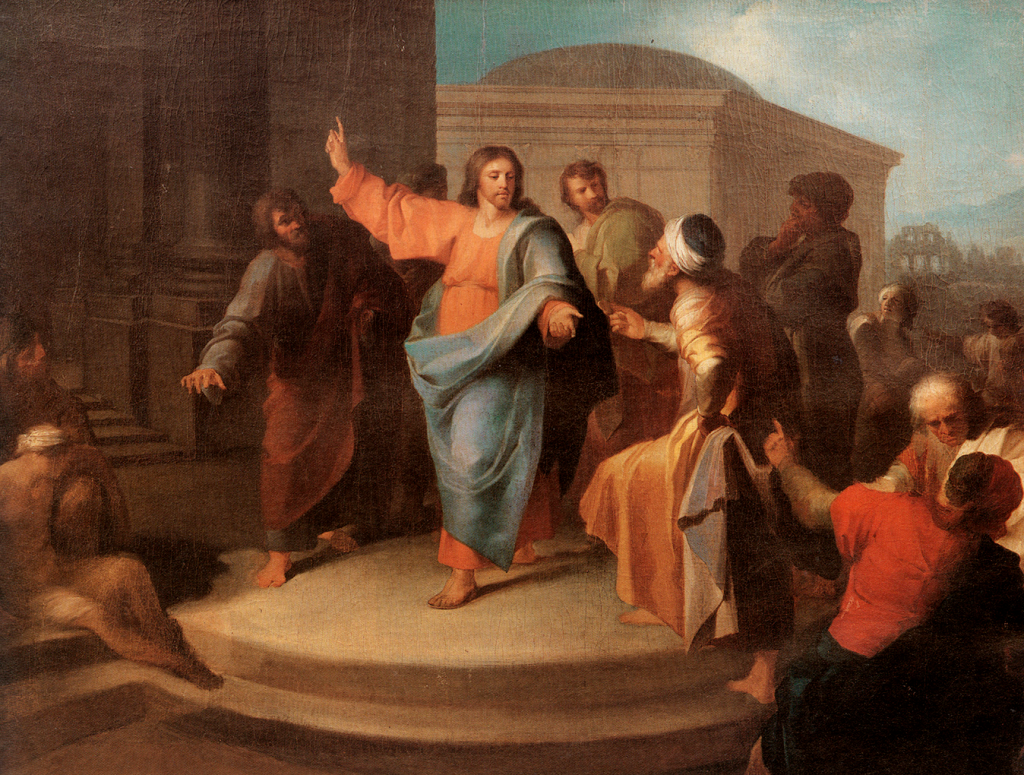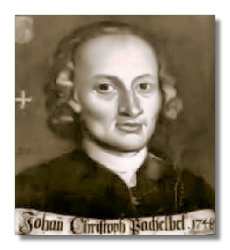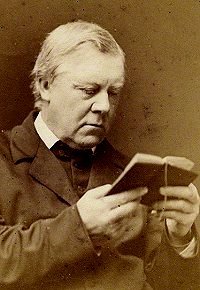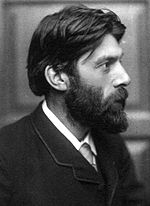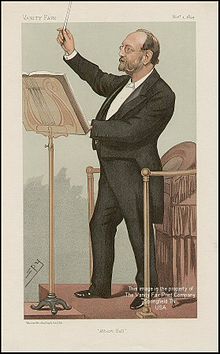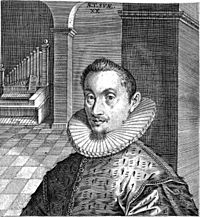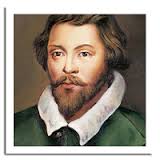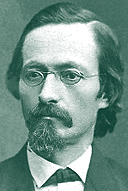Caesar’s Coin (1790), Domingos Sequeira (1768-1837)
Mount Calvary Church
A Roman Catholic Congregation of
The Personal Ordinariate of the Chair of St. Peter
Anglican Use
Trinity XIX
Prelude
Fantasia in G, Johann Pachelbel
Hymns
When morning gilds the skies
Be thou my vision
Let us, with a gladsome mind
Anthems
Cantate Domino, Hans Leo Hassler (1564 -1612)
Laetentur coeli, William Byrd
Common: Missa de S. Maria Magdalena, Willan
Postlude in G, op. 134, no. 6, Gustav Merkel (1827-1885)
____________________
Prelude
Fantasia in G, Johann Pachelbel (1653-1706)
Johann Pachelbel (1653 – 1706) was a German composer, organist, and teacher who brought the south German organ tradition to its peak.
___________________
When morning gilds the skies was translated by Edward Caswell (1814—1878). from an anonymous German text, “Beim frühen Morgenlicht,” thought to date from around 1800 (perhaps even the mid-1700s). The German text was first published in Sebastian Portner’s Katholisches Gesangbuch (1828). The words were reworked by Robert Seymour Bridges (1844—1930), England’s poet laureate (1913) and friend of Gerald Manley Hopkins, whose works he arranged to have published posthumously.
The images of the rising sun carry over to the second stanza as the “night becomes as day” and the “powers of darkness fear.” However, stanzas three and four switch from visual images of light to aural images “joyous with the sound” of praising Christ.
The hymn, like many hymns, was originally much longer. C. S, Lewis asked for better and shorter hymns, and most hymns in modern hymnals have at most five stanzas. Perhaps modern attention spans are shorter.
When morning gilds the skies my heart awaking cries:
May Jesus Christ be praised!
Alike at work and prayer, to Jesus I repair:
May Jesus Christ be praised!When you begin the day, O never fail to say,
May Jesus Christ be praised!
And at your work rejoice, to sing with heart and voice,
May Jesus Christ be praised!Whene’er the sweet church bell peals over hill and dell,
May Jesus Christ be praised!
O hark to what it sings, as joyously it rings,
May Jesus Christ be praised!My tongue shall never tire of chanting with the choir,
May Jesus Christ be praised!
This song of sacred joy, it never seems to cloy,
May Jesus Christ be praised!Does sadness fill my mind? A solace here I find,
May Jesus Christ be praised!
Or fades my earthly bliss? My comfort still is this,
May Jesus Christ be praised!To God, the Word, on high, the host of angels cry,
May Jesus Christ be praised!
Let mortals, too, upraise their voice in hymns of praise,
May Jesus Christ be praised!Be this at meals your grace, in every time and place;
May Jesus Christ be praised!
Be this, when day is past, of all your thoughts the last
May Jesus Christ be praised!When mirth for music longs, this is my song of songs:
May Jesus Christ be praised!
When evening shadows fall, this rings my curfew call,
May Jesus Christ be praised!When sleep her balm denies, my silent spirit sighs,
May Jesus Christ be praised!
When evil thoughts molest, with this I shield my breast,
May Jesus Christ be praised!The night becomes as day when from the heart we say:
May Jesus Christ be praised!
The powers of darkness fear when this sweet chant they hear:
May Jesus Christ be praised!No lovelier antiphon in all high Heav’n is known
Than, Jesus Christ be praised!
There to the eternal Word the eternal psalm is heard:
May Jesus Christ be praised!Let all the earth around ring joyous with the sound:
May Jesus Christ be praised!
In Heaven’s eternal bliss the loveliest strain is this:
May Jesus Christ be praised!Sing, suns and stars of space, sing, ye that see His face,
Sing, Jesus Christ be praised!
God’s whole creation o’er, for aye and evermore
Shall Jesus Christ be praised!In Heav’n’s eternal bliss the loveliest strain is this,
May Jesus Christ be praised!
Let earth, and sea and sky from depth to height reply,
May Jesus Christ be praised!Be this, while life is mine, my canticle divine:
May Jesus Christ be praised!
Sing this eternal song through all the ages long:
May Jesus Christ be praised!
Here is Coral Ridge. Here is First Plymouth in Lincoln, Nebraska.
Here is part of the German original:
Beim frühen Morgenlicht
Erwacht mein Herz und spricht,
Gelobt sei Jesus Christ!
So sing ich früh und spät,
Bei Arbeit und Gebet,
Gelobt sei Jesus Christ!Was tönst der schönste Klang
Der lieblichste Gesang?
Gelobt sei Jesus Christ!
In Gottes heiligem Haus
Sprech ich vor allem aus,
Gelobt sei Jesus Christ!Ihm, meinem höchster Gut,
Sing ich in Liebesglut,
Gelobt sei Jesus Christ!
Bei jeden Anbeginn
Ruf ich mit Herz und Sinn
Gelobt sei Jesus Christ!Im Himmel selbst erschallt,
Mit heiligem Gewalt!
Gelobt sei Jesus Christ!
Des Vaters ewigem Wort,
Ertönet ewig dort:
Gelobt sei Jesus Christ!Ihr Menschenkinder all
Singt laut im Jubelschall:
Gelobt sei Jesus Christ!
Ring um den Erdenkreis
Ertöne Gott zum Preis
Gelobt sei Jesus Christ!Singt Himmel, Erd und Meer,
Und alle Engel Heer:
Gelobt sei Jesus Christ!
Es Schalle weit und breit,
In Zeit und Ewigkeit:
Gelobt sei Jesus Christ!
Here is the tune the German version uses.
Edward Caswall (15 July 1814 – 2 January 1878) was an Anglican clergyman and hymn writer who converted to Roman Catholicism.
He was born at Yateley, Hampshire on 15 July 1814, the son of Rev. R. C. Caswall, sometime Vicar of Yateley, Hampshire.
Caswall was educated at Marlborough Grammar School and Brasenose College, Oxford, where he graduated Bachelor of Arts in 1836 with honours and later proceeded to Master of Arts. He was curate of Stratford-sub-Castle, near Salisbury, 1840–1847. In 1850, his wife having died the previous year, he joined the Oratory of St. Philip Neri under future Cardinal Newman, to whose influence his conversion to Roman Catholicism was due.
He wrote original poems that have survived mainly in Catholic hymnals due to a clear adherence to Catholic doctrine. Caswall is best known for his translations from the Roman Breviary and other Latin sources, which are marked by faithfulness to the original and purity of rhythm. They were published in Lyra Catholica, containing all the breviary and missal hymns (London, 1849); The Masque of Mary (1858); and A May Pageant and other poems (1865). Hymns and Poems (1873) are the three books combined, with many of the hymns rewritten or revised. Some of his translations are used in the Hymns Ancient and Modern. His widely used hymn texts and translations include “Alleluia! Alleluia! Let the Holy Anthem Rise”; “Come, Holy Ghost”; “Jesus, the Very Thought of Thee”; “When Morning Gilds the Skies”; and “Ye Sons and Daughters of the Lord”.
He died at the Oratory, Edgbaston, near Birmingham on 2 January 1878 and was buried at Rednal, near Bromsgrove, Worcestershire. (Wiki)
Robert Bridges (1844-1930) was poet laureate of England from 1913 until his death. At Oxford he was a friend of Gerald Manley Hopkins and arranged for the publication of Hopkins’ poetry posthumously.
Bridges wrote and also translated historic hymns, and many of these were included in Songs of Syon (1904) and the later English Hymnal (1906). Several of Bridges’ hymns and translations are still in use today:
“Thee will I love, my God and King”
“Happy are they that love God”
“Rejoice, O land, in God thy might”
The Baptist Hymn Book, University Press, Oxford 1962
“Ah, Holy Jesus” (Johann Heermann, 1630)
“All my hope on God is founded” (Joachim Neander, c. 1680)
“Jesu, Joy of Man’s Desiring” (Martin Jahn, 1661)
“O Gladsome Light” (Phos Hilaron)
“O Sacred Head, sore wounded” (Paulus Gerhardt, 1656)
“O Splendour of God’s Glory Bright” (Ambrose, 4th century)
“When morning gilds the skies” (stanza 3; Katholisches Gesangbuch, 1744)
The tune LAUDES DOMINI was composed for this text by Joseph Barnby (1839—1896), English organist and composer. The rising melodic motif complements the rising sun that “gilds the skies” of the early morning. Within two phrases we soar an octave above our starting pitch—indeed our voices ascend with the rising sun about which we are singing. The melody ends on an unusually high note for hymns, proclaiming the text, “May Jesus Christ be praised!” These five words form a brief refrain that encapsulates the intent of the entire hymn.
Joseph Barnby
Sir Joseph Barnby (1838-1896) was a prominent English musician and composer in the second half of the nineteenth century. Although his output of published works was prolific, he is more highly regarded today for his influence on the Victorian musical scene.
He was born in York in 1838, the youngest of a family of fifteen children. His father, as well as running a boot and shoe making shop on Swinegate, played the church organ and passed on his musical skills to his family. Joseph became a chorister at York Minster at the age of seven, following in the footsteps of six of his brothers, and at the tender age of twelve was appointed assistant organist and choirmaster, also at the Minster.
When he was sixteen, he moved down to London to study at the Royal Academy of Music. Two years later, he entered a competition for the first Mendelssohn Scholarship, but was beaten into second place by the young Arthur Sullivan.
He was organist at several London churches including St Andrew’s on Wells Street and St Anne’s in Soho, and during this time composed an enormous number of church services, anthems and hymn tunes. In 1869 he formed his own choir (the first Barnby Choir!) which gave the London premiere of Bach’s St John Passion. Three years later, his choir amalgamated with Charles Gounod’s choir to form the Royal Albert Hall Choral Society, now the Royal Choral Society. As well as introducing London audiences to old masters such as Bach, he also invited contemporary composers to give the British premieres of their works, including Verdi with his Requiem and Dvorak with his Stabat Mater.
In 1875 he was appointed Precentor at Eton College, and stayed there 17 years. He left in 1892 to take up the post of Principal of the Guildhall School of Music, and was knighted in the same year. He died in 1896, and his funeral was held at St Paul’s Cathedral.
From a long list of his works, only a handful have stood the test of time – his part song setting of Longfellow’s poem Sweet and Low, the hymn tune O PERFECT LOVE set to the hymn of the same title, and another hymn tune LAUDES DOMINI set to When Morning Gilds the Skies.
______________________
Be thou my vision. The Irish monk Eohaid Forgaill (530-598) was a Latin scholar and “King of the Poets.” He was said to have spent so much time studying that he went blind, and was give the name Dallán, “Little Blind One.” He wrote the poem, “Rop tú mo Baile” (Be Thou my Vision) asking God to be his vision. But “vision” here means more than physical sight. The original Irish word “baile” mean “vision” or “rapture,” in the sense used by the Old Testament prophets. The language of this hymn is drawn from traditional Irish culture: it uses heroic imagery to describe God. This was characteristic of medieval Irish poetry, which cast God as the ‘chieftain’ or ‘High King’ (Ard Ri) who provided protection to his people or clan.
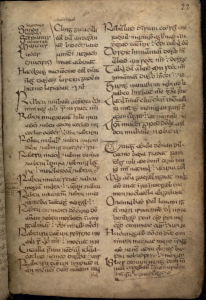 14th C. Manuscript MG 3, National Library of Ireland
14th C. Manuscript MG 3, National Library of Ireland
containing “Rob tu mo bhoile”
The Irish monk Eohaid Forgaill (530-598) was a Latin scholar and “King of the Poets.” He was said to have spent so much time studying that he went blind, and was give the name Dallán, “Little Blind One.” He wrote the poem, “Rop tú mo Baile” (“Be Thou my Vision”) asking God to be his vision But “vision” here means more than physical sight. The original Irish word “baile” mean “vision” or “rapture,” in the sense used by the Old Testament prophets.
This was translated into literal prose by Irish scholar Mary Byrne (1880-1931), a Dublin native, and then published in Eriú, the journal of the School of Irish Learning, in 1905. Eleanor Hull (1860-1935b), born in Manchester, was the founder of the Irish Text Society and president of the Irish Literary Society of London. Hull versified the text and it was published in her Poem Book of the Gael (1912).
Irish liturgy and ritual scholar Helen Phelan, a lecturer at the University of Limerick, points out how the language of this hymn is drawn from traditional Irish culture: “One of the essential characteristics of the text is the use of ‘heroic’ imagery to describe God. This was very typical of medieval Irish poetry, which cast God as the ‘chieftain’ or ‘High King’ (Ard Ri) who provided protection to his people or clan. The lorica (Latin: breastplate) is one of the most popular forms of this kind of protection prayer and is very prevalent in texts of this period.” St. Patrick’s Breastplate (1940 The Hymnal, #268) is in this genre.
Hull’s verse version was paired with the Irish tune SLANE in The Irish Church Hymnal in 1919. The folk melody was taken from a non-liturgical source, Patrick Weston Joyce’s Old Irish Folk Music and Songs: A Collection of 842 Airs and Songs hitherto unpublished (1909).
“Most ‘traditional’ Irish religious songs are non-liturgical,” says Dr. Phelan. “There is a longstanding practice of ‘editorial weddings’ in Irish liturgical music, where traditional tunes were wedded to more liturgically appropriate texts. This is a very good example of this practice.”
Back in 433 AD, on the eve of Bealtine, a Druidic Holiday that lines up directly with Easter as well as the spring equinox, it was declared by the King, Leoghaire (Leary) Mac Neill, that no fires were to be lit until the fire atop of Tara Hill was lit. Going against the kings wishes, St. Patrick went out to Slane Hill and lit a candle to celebrate the resurrection of Christ. The king was so impressed by the courage that St. Patrick had shown, Leoghaire let him continue his missionary work throughout Ireland. The tune was given the name SLANE to commemorate this event.
English translation by Mary Byrne, 1905:
Be thou my vision O Lord of my heart
None other is aught but the King of the seven heavens.Be thou my meditation by day and night.
May it be thou that I behold even in my sleep.Be thou my speech, be thou my understanding.
Be thou with me, be I with theeBe thou my father, be I thy son.
Mayst thou be mine, may I be thine.Be thou my battle-shield, be thou my sword.
Be thou my dignity, be thou my delight.Be thou my shelter, be thou my stronghold.
Mayst thou raise me up to the company of the angels.Be thou every good to my body and soul.
Be thou my kingdom in heaven and on earth.Be thou solely chief love of my heart.
Let there be none other, O high King of Heaven.Till I am able to pass into thy hands,
My treasure, my beloved through the greatness of thy loveBe thou alone my noble and wondrous estate.
I seek not men nor lifeless wealth.Be thou the constant guardian of every possession and every life.
For our corrupt desires are dead at the mere sight of thee.Thy love in my soul and in my heart —
Grant this to me, O King of the seven heavens.O King of the seven heavens grant me this —
Thy love to be in my heart and in my soul.With the King of all, with him after victory won by piety,
May I be in the kingdom of heaven O brightness of the son.Beloved Father, hear, hear my lamentations.
Timely is the cry of woe of this miserable wretch.O heart of my heart, whatever befall me,
O ruler of all, be thou my vision.
Here is the hymnal version. Verse three is usually omitted.
Be Thou my Vision, O Lord of my heart;
Naught be all else to me, save that Thou art;
Thou my best Thought, by day or by night,
Waking or sleeping, Thy presence my light.Be Thou my Wisdom, and Thou my true Word;
I ever with Thee and Thou with me, Lord;
Thou my great Father, I Thy true son;
Thou in me dwelling, and I with Thee one.Be Thou my battle Shield, Sword for the fight;
Be Thou my Dignity, Thou my Delight;
Thou my soul’s Shelter, Thou my high Tow’r:
Raise Thou me heav’nward, O Pow’r of my pow’r.Riches I heed not, nor man’s empty praise,
Thou mine Inheritance, now and always:
Thou and Thou only, first in my heart,
High King of Heaven, my Treasure Thou art.High King of Heaven, my victory won,
May I reach Heaven’s joys, O bright Heav’n’s Sun!
Heart of my own heart, whate’er befall,
Still be my Vision, O Ruler of all.
Although there are hundreds of versions of Be Thou my vision on the Internet, all the vocals ones are not very satisfactory.
Here is the Mormon Tabernacle Choir. Here is King’s College, Cambridge.Here it is arranged as an art song. Here sung in Modern Irish.
Here is a charming version for violin and harp. A good arrangement for cello and piano. Of course for Celtic instruments. For string quartet. For brass quintet! For marching band!!
Let us with a gladsome mind is a versification of Psalm 136 by John Milton, who was fifteen and a schoolboy at St. Paul’s.\ when he wrote it.
The original is long; the 1940 Hymnal uses the stanzas in red:
Let us with a gladsome mind
Praise the Lord for he is kind;
For his mercies aye endure,
Ever faithful, ever sure.Let us blaze his Name abroad,
For of gods he is the God;
For his, &c.O let us his praises tell,
That doth the wrathful tyrants quell;
For his, &c.That with his miracles doth make
Amazèd Heaven and Earth to shake;
For his, &c.That by his wisdom did create
The painted heavens so full of state;
For his, &c.That did the solid Earth ordain
To rise above the watery plain;
For his, &c.That by his all-commanding might,
Did fill the new-made world with light;
For his, &c.And caused the golden-tressèd Sun
All the day long his course to run;
For his, &c.The hornèd Moon to shine by night
Amongst her spangled sisters bright;
For his, &c.He, with his thunder-clasping hand,
Smote the first-born of Egypt land;
For his, &c.And, in despite of Pharao fell,
He brought from thence his Israel;
For his, &c.The ruddy waves he cleft in twain
Of the Erythræan main;
For his, &c.The floods stood still, like walls of glass,
While the Hebrew bands did pass;
For his, &c.But full soon they did devour
The tawny King with all his power;
For his, &c.His chosen people he did bless
In the wasteful Wilderness;
For his, &c.In bloody battail he brought down
Kings of prowess and renown;
For his, &c.He foiled bold Seon and his host,
That ruled the Amorrean coast;
For his, &c.And large-limbed Og he did subdue,
With all his over-hardy crew;
For his, &c.And to his servant Israel
He gave their land, therein to dwell;
For his, &c.He hath, with a piteous eye,
Beheld us in our misery;
For his, &c.And freed us from the slavery
Of the invading enemy;
For his, &c.All living creatures he doth feed,
And with full hand supplies their need;
For his, &c.Let us, therefore, warble forth
His mighty majesty and worth;
For his, &c.That his mansion hath on high,
Above the reach of mortal eye;
For his, &c.
Here is the Mormon Tabernacle Choir.
The tune MONKLAND has a fascinating if complex history. Rooted in a tune for the text “Fahre fort” in Johann A. Freylinghausen’s famous hymnal, Geistreiches Gesangbuch (1704), it then was significantly altered by John Antes (b. Frederick, PA, 1740; d. Bristol, England, 1811) in a Moravian manuscript, A Collection of Hymn Tunes (c. 1800). Antes was a missionary, watchmaker, business manager, and composer. Born near the Moravian community of Bethlehem, Pennsylvania, he was trained at the Moravian boys’ school and later received religious education and further training as a watchmaker in Herrnhut, Germany. From 1770 to 1781 he served as a missionary in Egypt and from 1783 until his death was the business manager of the Moravian community in Fullneck, England. Although music was his avocation, Antes was a fine composer and musician. Among his compositions are a number of anthems, several string trios, and over fifty hymn tunes.
MONKLAND received its present shape at the hands of John Lees in another Moravian hymnal, Hymn Tunes of the United Brethren (1824). From there John Wilkes (b. England, date unknown; d. England, 1882) simplified it and introduced it to Henry W. Baker, who published it in the English Hymns Ancient and Modern (1861) to his own harvest-theme text, “Praise, O Praise Our God and King.” Wilkes named the tune after the village where he was organist and Baker was vicar–Monkland–located near Leominster in Herefordshire, England. Wilkes died around 1882; he should not be confused with the better-known John Bernard Wilkes (1785-1869). (Hymnary)
The 1940 Hymnal is apparently mistaken in attributing it to John Bernard Wilkes rather than to John Wilkes.
_______________________
Anthems
Cantate Domino, Hans Leo Hassler
Cantate Domino canticum novum; cantate Domino omnis terra. Cantate Domino, et benedicite nomini ejus; annuntiate de die in diem salutare ejus. Annuntiate inter gentes gloriam ejus; in omnibus populis mirabilia ejus.
O sing unto the Lord a new song: sing unto the Lord, all the whole earth. Sing unto the Lord, and praise his Name: be telling of his salvation from day to day. Declare his honour unto the heathen: and his wonders unto all people.
Here it is sung by the UCLA Early Music ensemble,
Hans Leo Hassler
Hans Leo Hassler (1564- 1612) was the first German composer of the Renaissance who went to Italy to continue studies; he studied in Venive inder Andrea Gabrieli, Giovanni’s uncle, He returned to Germany, where he was an expert organist as well as a composer. Hassler’s influence was one of the reasons for the Italian domination over German music and for the common trend of German musicians finishing their education in Italy. Though Hassler was Protestant, he wrote many masses and directed the music for Catholic services in Augsburg.
_____________________
Laetentur coeli, William Byrd
Laetentur coeli, et exultet terra. Jubilate montes laudem, quia Dominus noster veniet, et pauperum suorum miserebitur. Orietur in diebus tuis justitia et abundantia pacis. Let the heavens be glad and let the earth rejoice.
Let the mountains be joyful with praise, because our Lord will come, and will show mercy to his poor. In your days, justice and abundance of peace shall arise.
Here it is sung by the Roskilde Domkirkes Drengekor.
William Byrd (c. 1540-1623)
16th Century England, under the charge of Queen Elizabeth I, was officially Protestant; and although Byrd was famous in his day, he constantly lived in fear of losing commissions because of his Catholic faith. Because of this, many of Byrd’s earlier sacred works were smaller in scope, and included phrases and musical suspensions meant to secretly signify the desire for equal protection for Catholics in England.
_______________________
Postlude
Postlude in G, op. 134, no. 6, Gustav Merkel (1827-1885)
Here is Stephen Mann at the English Martyrs’ Church.
Gustav (Adolf) Merkel (November 12, 1827, Oberoderwitz, Kingdom of Saxony – October 30, 1885, Dresden) was a German organist and composer. Having been given some lessons by Schumann in his youth, Merkel spent most of his career in Dresden, concentrating on organ-playing from 1858. A Lutheran himself, he nevertheless held an appointment at one of Dresden’s main Catholic churches from 1864 until his death. During the same period he taught the organ at Dresden’s Conservatorium.
